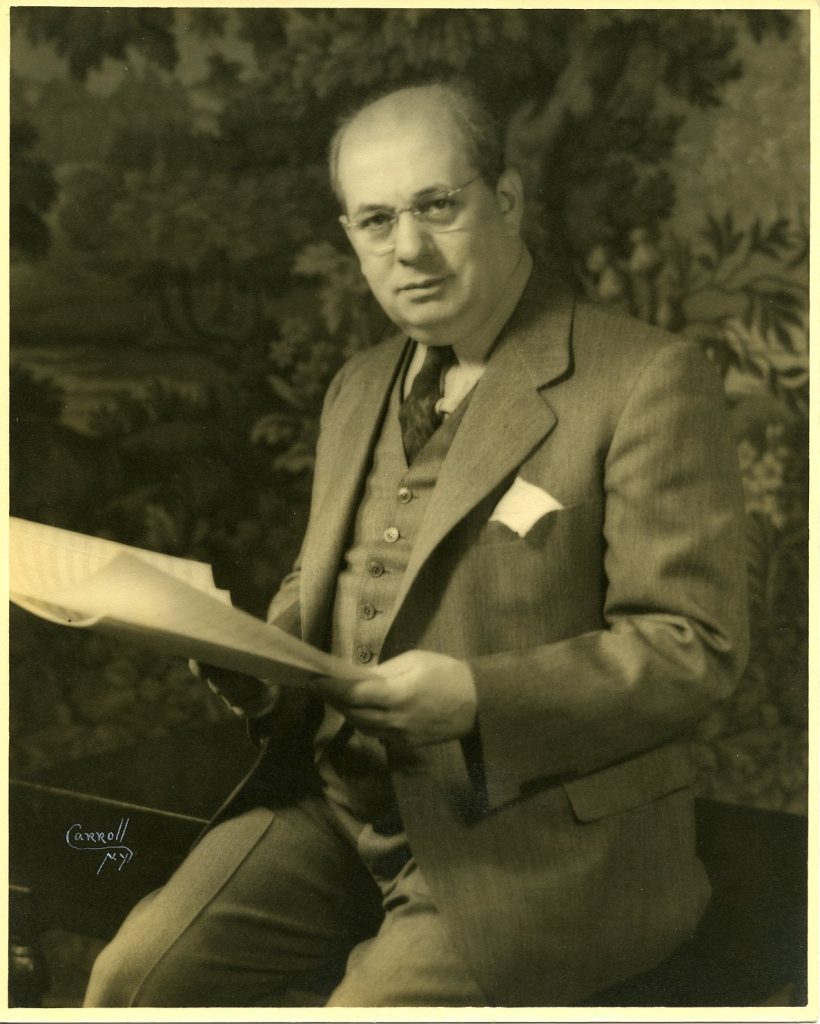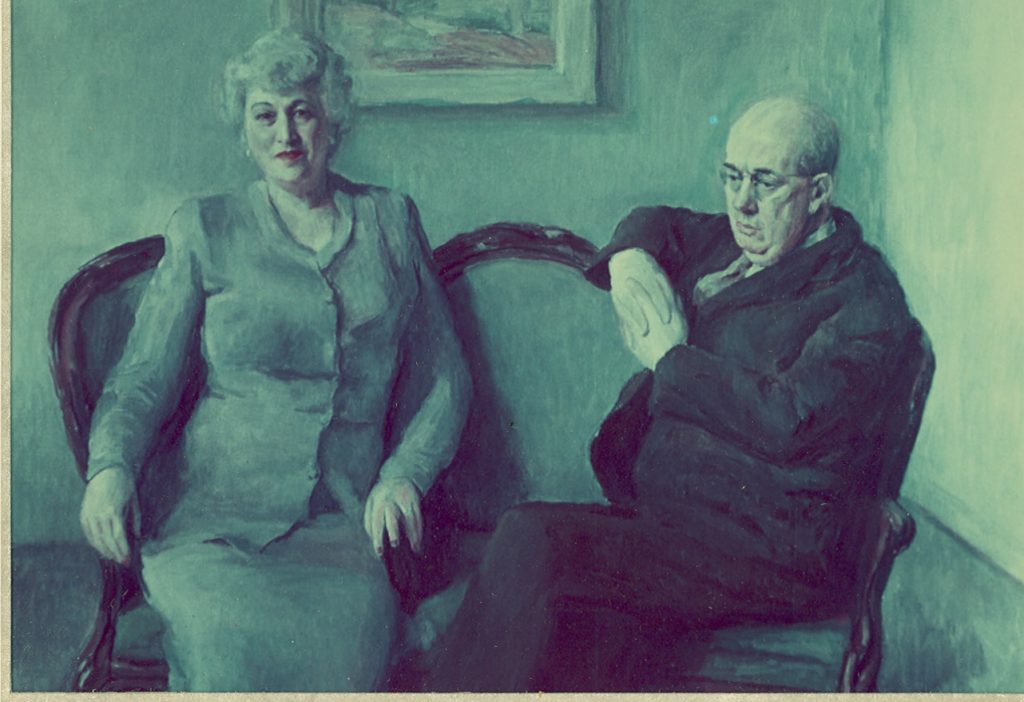Seventy Years Since the Death of Ignatz Waghalter
Seventy years ago, on the morning of April 7, 1949, Ignatz Waghalter, died suddenly of a massive heart attack in his New York City apartment on Central Park West. He was 68 years old.

Waghalter’s death came almost exactly 12 years after he had arrived in the United States, having been forced to flee Europe following the rise of the Nazi regime to power.
Despite the many difficulties Waghalter confronted as a refugee in the United States, his founding of the American Negro Orchestra in 1938 — the first classical symphony orchestra comprised of African-American musicians — was a historically significant contribution to both the fight for civil rights and the cultural life of the United States.
Waghalter continued to compose after arriving in New York. His most significant work was the New World Suite, which he wrote for the American Negro Orchestra. In the summer of 1948, Waghalter’s last major composition — an operetta titled Ting-ling, based on a Chinese fairy tale — was performed at the Play House in Olgunquit, Maine. At the time of his death, Waghalter was working on another operetta and a musical transcription of the Biblical Psalms.
Although he had worked late into the previous evening, Waghalter arose, as was his habit, early on the morning of Thursday, April 7, 1949. By the time his wife, Toni, awoke shortly before 9 a.m., Ignatz had already spent several hours reading and orchestrating. He also had prepared breakfast. Waghalter was in an expansive mood, and he requested that Toni dress before breakfast. Ignatz wanted to take a walk with Toni through Central Park immediately after breakfast had been completed.
Toni returned to the bedroom to dress for the day. Ignatz came into the room, and embraced her. As she later recalled, he spoke to her with exceptional tenderness. Ignatz reminded her that they had lived together for 46 years, and that he remained hopeful for the future. And then Ignatz spoke what were to be his last words. “I want to bring the stars down from heaven for you.” [Ich möchte dir doch die Sterne vom Himmel herunter holen.]
Ignatz laughed, and then turned away and left the bedroom. Moments later, Toni heard a loud noise from outside the bedroom. Ignatz had fallen, and was lying on the floor unconscious. She went to seek help from neighbors in the apartment building on 385 Central Park West. They rushed back into the apartment, but there was nothing to be done. Ignatz was already dead.
Waghalter’s passing was noted in an obituary that was published in The New York Times on April 8. The funeral service was held that day at the historic Riverside Chapel on New York’s Upper West Side. News of Waghalter’s death had spread quickly throughout New York’s substantial community of German-Jewish refugees. The service was presided over by Rabbi Joachim Prinz, who was also a refugee, and whose friendship with Waghalter dated back to pre-1933 Berlin.
Rabbi Prinz, deeply affected by Waghalter’s death, said to the mourners who filled the chapel: “Who can believe that all that was once Ignatz Waghalter lies in this coffin?”
Waghalter’s remains were laid to rest in a cemetery in Queens, New York. His widow, Toni, survived her husband by 15 years. She died on November 29, 1964 at the age of 79.
In the decades that followed Waghalter’s death, his music and life work fell into oblivion. It was not until March 1981, the centenary of Waghalter’s birth, that the Deutsche Oper in Berlin took official note of the man who had conducted its first performance in November 1912; and who had played a decisive role in establishing the musical profile of the Deutsche Opernhaus (as it was then known) during the first decade of its existence. On April 22, 1989, the Deutsche Oper, performed with piano accompaniment selections from Waghalter’s 1917 opera Jugend .
But the significant revival of interest in Waghalter’s music would only begin in 2011, more than 60 years after his death, with the discovery and recording of his extraordinary Concerto for Violin in A Major and Rhapsodie for Violin and Orchestra. The acclaimed Naxos recording, with soloist Irmina Trynkos and conductor Alexander Walker, introduced a new generation of music lovers, less influenced by the post-World War II prejudice of academics and critics against composers who worked in a melodic idiom, to Waghalter’s music. In 2014, Waghalter’s Violin Concerto was performed at the Gala Concert celebrating the opening of the new Museum of Polish-Jewish History in Warsaw.
On May 17, 2019, Ignatz Waghalter’s New World Suite, whose manuscript was discovered in 2012 and recorded for Naxos under the direction of Alexander Walker in 2015, will be given its live world premiere performance in Poland by the Poznań Filharmonia. The performance, under the direction of Israeli-born conductor Ariel Zuckermann, will be broadcast by Deutschlandradio Kultur.
Seventy years after the composer’s death, his music lives on.

=============
The Following is the text of the New York Times report on the death of Ignatz Waghalter, published on April 8, 1949:
I. WAGHALTER, 68, LONG A CONDUCTOR
Polish-Born Composer Dead-Led Orchestras in Germany Before Coming Here in ’37
Ignatz Waghalter, Polish-born composer and conductor, died yesterday of a heart attack in his home at 385 Central Park West. His age was 68.

Mr. Waghalter, who had lived in the United States since 1937, was conductor at the German Opera House in Berlin from 1912 to 1923. In his first appearance in this country as conductor in 1923 with the New York Symphony Orchestra, he won an ovation.
Since making his permanent residence in this country, Mr. Waghalter had conducted the Doctors Orchestra, composed of physicians and dentists. Last year his operetta, “Ting-ling,” was produced at the Ogunquit (Me.) Playhouse. He had Just completed before his death the music for a new operetta for the same playhouse.
Bom in Warsaw of an old musical family, he played at the age of 13 the big drum in a circus, where his first compositions — marches, dances and the like— were written and performed. Running away from home three years later, he went to Berlin and took a position under Conductor Meyder of the Berlin Concert Haus, where he began as a kettle drummer.
Studied Composing 5 Years
At 17 he began his studies for piano at Klindworth Scharwenka Conservatory. Because of his talent for composition, he was placed in the master school of composition of Friedrich Gemsheim, where he remained for five years. Upon receiving his diploma he was named by Director Hans Gregor as an assistant conductor of the Opera Comique of Berlin in 1905. He showed such musicianship that upon the indisposition of a conductor, Gregor called upon him to conduct without any rehearsal.
In 1906 Mr. Waghalter went with Gregor to London to assist conducting some special performances of the opera, “Tales of Hoffmann.” Gregor then named him first conductor of the Opera Comique. In 1911 his first opera, “Teufelsweg,” was produced in Berlin. He then was appointed first conductor of the newly-built Grosse Deutsche Opera at Charlottenburg, Berlin.
In 1912 he conducted several concerts at the Augusteum in Rome. The next year he Conducted concerts at Barcelona, Spain. On March 29, 1913, he conducted in Berlin the premiere performance of “The Girl of the Golden West,” with Puccini present.
Stayed in Berlin Through War
At the outbreak of the first World War there were protests against Mr. Waghalter, a Pole, conducting in the German Opera House. His popularity was so great, however, that he was allowed to retain his position throughout the war.
In 1925 he succeeded Josef Stransky as conductor of the State Symphony Orchestra in New York. The next year he returned to Berlin. and in 1933 moved to Prague.
His operas included ‘Mandragola,” “Jugend” and “Der Späte Gast”; his operettas, “Der Weiberkrieg” and “Wem gehört Helena?” He also composed a vaudeville, “Bibi”; Violin Concerto in A, Op. 15; String Quartette in D. Op. 3, and Violin Sonata in F Minor, Op. 5.
Leave a Reply
You must be logged in to post a comment.